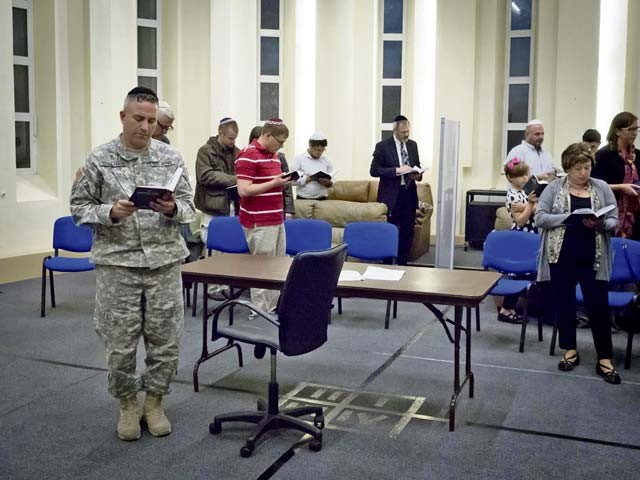
Chaplain (Maj.) Andrew Shulman and the congregation conduct a Rosh Hashanah service Sept. 18 at the Pulaski Chapel on Vogelweh.
An Army Reserve chaplain traveled from his home in Israel to bring together people of the Jewish faith in the KMC to New Year’s services.
Chaplain (Maj.) Andrew Shulman, 7th Civil Support Command, conducted the week of services in the KMC Sept. 11 to 18. Services assembled a congregation from the local American military bases, the surrounding German community and other military facilities to celebrate the Jewish New Year.
“In between England and Israel, it’s about the only place you can find a service in English,” Shulman said.
The holiday week included: the last Sabbath of the Jewish year on Sept. 11; Rosh Hashanah services on Sept. 13 to 15; and the first Sabbath service on Sept. 18.
Shulman was needed because the Jewish chaplain on Ramstein moved to a new duty station, leaving the base without one.
Most of the Rosh Hashanah services were held at the Pulaski Chapel on Vogelweh Kaserne. However, the morning services took place at the German synagogue in Kaiserslautern.
“Right in the center of town, there’s a small synagogue,” Shulman said. “They love having guests at the synagogue, especially American servicemen.”
After those services, the congregation returned to the Pulaski Chapel for lunch.
For people who are far away from home, the food and fellowship after the services is very important, Shulman said.
“People might have had these dishes since they were kids,” Shulman said. “Food means a lot when they are away from home.”
On the first night of Rosh Hashanah, there are symbolic fruits that are eaten, and the names of the fruit correspond to best wishes for the new year.
“For instance, we dip an apple in honey and wish everyone a sweet new year,” Shulman said.
Another traditional activity is to blow the shofar, or ram’s horn, at the start of the new year.
“Think of it as an alarm clock for the soul,” Shulman said. “It wakes us up to get us moving toward what we have to do; to get correct what needs to be corrected.”
This is the year 5776 on the Jewish calendar, which marks the day Adam and Eve were created, he said.
The services were attended by service members from the local area, as well as spouses, civilian employees and local German nationals, Shulman said. In addition, others traveled from around Germany.
This kind of congregation is unique because it is so diverse, Shulman said. In the United States, most communities have several synagogues from which people can choose, some more liberal and others more traditional.
“In the military, there’s usually just one,” he added. “You really have to cater to everyone in the pews.”
This is not new to Shulman, who was a chaplain on active duty before joining the Army Reserve about a year ago. During battle assembly weekend, he typically conducts Friday night services in Grafenwoehr.
Shulman travels from Jerusalem, Israel to perform his Army Reserve duties.
In his civilian life, Shulman is a student at the Jerusalem Academy of Jewish Studies, where he is a currently pursuing a master’s degree.







